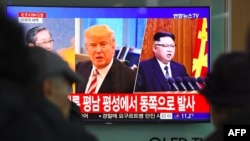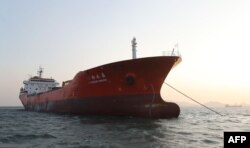The Associated Press reported early Saturday that in the first month of U.S. President Donald Trump's term in office, he sent "an American scholar" to meet with North Korean officials and to relay a message.
The message was that the new administration was appreciative of a nearly four-month freeze of the North's nuclear and ballistic missile tests - and thought it "might just offer a ray of hope," the news agency said in its account.
However, the AP reported North Korean officials said the lack of testing wasn't a sign of conciliation and insisted Kim Jong Un would order tests whenever he wanted. Two days later, the North launched a new medium-range missile, ushering in a year of escalating tensions.
Meanwhile, Reuters reported late Friday that "Russian tankers have supplied fuel to North Korea on at least three occasions in recent months by transferring cargoes at sea." Reuters attributed the information to two senior Western European security sources.
Russia is a member of the United Nations Security Council. The sale of oil and oil products to North Korea would be a breach of U.N. sanctions
One security source told Reuters "Russian vessels have made ship-to-ship transfers of petrochemicals to North Korean vessels on several occasions this year in breach of sanctions."
Another security source told the news agency, "There is no evidence that this is backed by the Russian state, but these Russian vessels are giving a lifeline to the North Koreans."
Reuters said both sources "cited naval intelligence and satellite imagery of the vessels operating out of Russian Far Eastern ports on the Pacific."
Denials from China
The new reports come as China has denied facilitating oil shipments to North Korea in violation of United Nations Security Council sanctions, one day after Trump accused Beijing of doing so.
"China has been completely and strictly implementing Security Council resolutions and fulfilling our international obligations,'' foreign ministry spokeswoman Hua Chunying told reporters Friday at a media briefing. "We will never allow Chinese citizens and enterprises to engage in activities that violate Security Council resolutions."
Despite China's insistence the sanctions are being enforced, doubts persist in the U.S., South Korea and Japan that loopholes continue to exist. And China's repeated denials did not preclude Trump from tweeting Thursday he was "very disappointed that China is allowing oil to go into North Korea."
The U.N. Security Council last week imposed new sanctions designed to limit North Korea access to oil in response to the country's recent long-range missile test. In November, it test-launched its latest intercontinental ballistic missile, which many U.S. experts have warned would be capable of striking anywhere on U.S. soil. The sanctions seek to bar 90-percent of refined oil exports to North Korea by capping them at 500,000 barrels a year and limit crude oil exports at 4 million barrels annually.
Ship seized
South Korea's Foreign Ministry said earlier Friday the country had seized a Hong Kong-flagged ship that transferred oil to a North Korean vessel in international waters despite the sanctions.
Yonhap, the South Korean news agency, reported South Korean officials said the Lighthouse Winmore vessel transferred "600 tons of refined petroleum" to a North Korean ship on October 19 and that the ship was seized on November 24 after it sailed into South Korea's Yeosu Port.
Yonhap reported the vessel was chartered by the Billions Bunker Group, a Taiwanese company. The ship's "claimed destination" was reportedly Taiwan, but the ship instead "transferred oil to a North Korean ship, Sam Jong 2, and three other non-North Korean vessels in international waters in the East China Sea."
Yonhap said South Korea informed the U.S. about its "detection of the illegal transaction" involving the Lighthouse Winmore, which is reportedly on the list of ships the U.S. has proposed blacklisting for prohibited trade with North Korea.
Hua, China's Foreign Ministry spokeswoman, said authorities investigated a report that an unnamed Chinese ship transferred oil to a North Korean vessel at sea on October 19 and determined it was erroneous. Hua also said she did not have any information about the Hong Kong-flagged vessel.
Satellite images
In November, the U.S. Treasury Department disclosed satellite images that displayed what it said was a North Korean ship receiving oil from an unidentified vessel on October 19. It was not immediately clear if the Lighthouse Winmore was involved in the transaction.
The photos received broader public scrutiny this week when the South Korean newspaper Chosun Ilbo reprinted them along with the report that suspected Chinese ships transferred oil to North Korean vessels about 30 times since October.
In an interview with the New York Times Thursday, Trump linked his trade policy with China to its cooperation in resolving the North Korean nuclear crisis.
"If they're helping North Korea, I can look at trade a little bit differently, at least for a period of time. And that's what I've been doing. But when oil is going in, I'm not happy about that."
During a briefing Friday with reporters at the Pentagon, U.S. Defense Secretary Jim Mattis was asked if the U.S. Navy could begin seizing ships suspected of providing oil to North Korea.
Mattis declined to speculate but said, "Obviously if a government finds that there is a ship in their port conducting trade that was forbidden under the U.N. Security Council resolution, then they have an obligation and so far we have seen nations take that obligation seriously."
Mattis also predicted the global community will increase pressure on Pyongyang and said physical approaches are among the options under consideration.
"What form that pressure takes in terms of physical operations is something that will be determined by the cognizant governments," he said.
China is North Korea's primary trading partner, energy supplier and main diplomatic protector. But Beijing has expressed increasing frustration with North Korea's nuclear and missile tests. And while China supports the latest sanctions against Pyongyang, it has argued against actions that may be harmful to North Korean citizens or destabilize its government.






